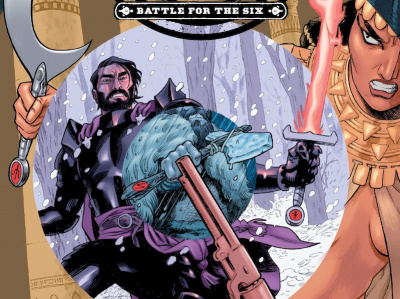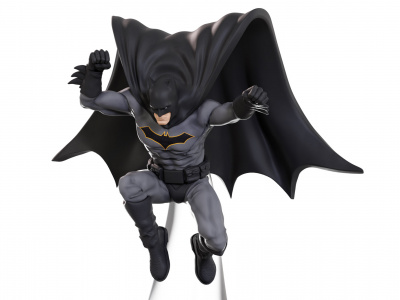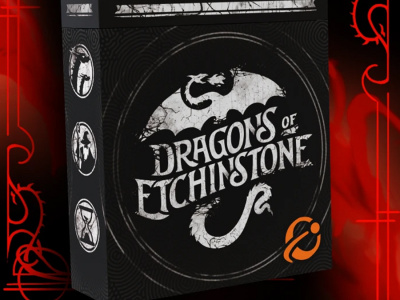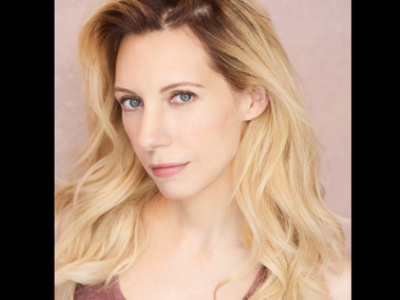In-store gaming events have become a critical part of marketing games in recent years, with companies such as WizKids, Decipher, Score, and others joining Wizards of the Coast in mounting major national and international organized play programs. The events range from demos of new games to local leagues to major international tournament programs with huge prizes. A tournament program is now de rigueur for new CCG (and CMG) releases, and more and more pop culture retailers are devoting a percentage of their space to gaming.
To start to learn more about this phenomenon, we looked for retailers that run a lot of events in their stores to gain the benefit of their experience. For this first of a series of articles, we talked to two larger retailers in different parts of the country: Steve Zwanger of Neutral Ground in New York City and Alan Hochman at Pastimes Sports Cards, Comics, and Games in Glenview, Illinois.
Neutral Ground is a 6000 square foot store with 4000 square feet of playing area on 26th St. in Manhattan. It sells CCGs, board games, RPGs, and miniature games.
There are two Pastimes stores, one a 1400 square foot store with game space for 24 players, and the other a 10,000 square foot store with 5,000 square feet of gaming space. Pastimes carries miniature games, CCGs, and RPGs Here's our Q&A:
1.What kind of events do you run?
Both Neutral Ground and the larger of the two Pastimes stores have the capacity to run either large single events or multiple smaller events simultaneously; the smaller Pastimes store runs one event at a time. Neutral Ground runs events for Magic (the biggest, Zwanger said), Mage Knight, Lord of the Rings, Star Trek, LO5R, Shadowfist, Vampire, Warhammer and others, in sizes ranging from eight players to 350. They run fifteen to twenty events per week. Pastimes runs six to eight tournaments per week for Magic, Mage Knight, LO5R, Star Wars, Star Trek, Lord of the Rings, Pokemon and others. Pastimes had a higher range of sizes, from two players up to six hundred at a pre-release Magic event.
This range of sizes reflects not only the varying popularity of games, but the difference between major events and regular weekly games. The simplest arrangement is a weekly league, occurring at the same time every week, for players of a particular game. A tournament with vendor-supplied or cash prizes can be larger, involving more games. An event tied to the release of a new product (e.g., Mage Knight Marquis events) is a special tournament to promote and involve players in a new game or expansion. At the upper size end of gaming events are pre-release Magic events or regional tournaments, which pull players from a broader area to a single location (see 'Wizards of the Coast Street Date Policy').
Pastimes' Hochman emphasized that much of the gaming space needed for his larger store was for these special events, which not all stores run. 'If we were not running the premiere Magic events, I would never go to that much size for gaming space,' he said. 'I think space for 24 players for the average store is the way to go.'
For both retailers during the week, it's more common to have an event or two a day, with more going on for the weekends. Not only does holding multiple events at the same time bring more players into their stores, it also creates a positive gaming atmosphere. Hochman said, 'Everybody feels like it's more of a gaming community when they're playing Magic, Pokemon, LO5R, and Mage Knight all at the same time.'
Pastimes emphasizes the weekend activity at the store with the slogan, 'Other people call them conventions, we call them Saturday.'
2.What about demos?
Neither of the two retailers we talked to emphasized demos heavily, although both of them did some. Zwanger said at Neutral Ground they ran demos every couple of weeks to teach new games to players, but did not do demos for long-lived games like Magic. Hochman told us that Pastimes does demos, but that even when they're promoted, they don't work that well relative to tournaments.
3.Who runs your events?
Both used a combination of paid staff and volunteers to run their gaming events.
4.Timing--
Both stores run both weekday and weekend events. Both also have gaming well into the evening, beyond normal store hours, requiring more staff time than a straight retail operation.
5.How do you promote your gaming events?
The basic elements of promoting gaming events revolve around letting people know when the events are and giving them a reason to come. Prizes for winners range from special collectibles provided by manufacturers (for example, the Mage Knight figures from WizKids, or the WWF 'Belt Cards' from Comic Images), to cash or gift certificate prizes drawn from the entry fees for the games. Both retailers charge for some events, at times including product for the player as part of the entry fee, or putting all of the money into a purse for the winner.
An events board in the store is a key part of letting shoppers know when the events will occur. Both of the retailers we talked to also used mailings. Neutral Ground does monthly calendar mailings, and Pastimes does weekly e-mail blasts to its 4500 name list. Both have Websites, where schedules and post-event reports can be found (see Neutralground.net and Pastimes.net). Both also list their events on manufacturers' Websites.
6.What kind of manufacturer support do you get?
Manufacturers provide varying levels of support. Event listings on manufacturer Websites (above) are common, as are prizes for national or international winners. Less common is the ability to register for events at particular stores on manufacturer Websites. Some companies provide prizes, while others do not. WizKids tournament support includes prizes (a special figure), rules, and forms to record events. Large amounts of collateral material are also flowing from Decipher and Score.
Hochman of Pastimes was especially complimentary of WotC's program and the varying levels of support for different stores, including special regional events at a smaller tier of stores. He said of WotC's program, 'Wizards of the Coast has spent a lot of time and money figuring these things out. It amazes me that other companies haven't utilized the model that Wizards of the Coast has put in place. WizKids did that a little bit; their product support is similar to Friday night Magic. But on a premiere event level, making the game take another step above, the other companies don't.' He did acknowledge of pre-release tournaments, however, 'If I weren't running them, I might think they're a mediocre idea,' offering as an alternative rotating special events between a group of stores in a region.
7.What's the relationship between events and sales?
Zwanger said at Neutral Ground there was a direct connection between sales and events, primarily because of the store traffic generated. For example, the best Mage Knight sales are the weekends of Marquee Tournaments because there are more players in the store, who end up picking up some boosters, or a new large figure while they're there.
Pastimes' Hochman focused more on the long term benefits, saying 'You can't totally equate game space to sales.' He noted that if there was a gap between new releases, when players came to the store for events they tended to play without buying, so there was no direct connection between the event and sales in that case. He felt continuing play during those periods was beneficial, however, for maintaining interest in the game and promoting the next big release. Even some larger events didn't produce dramatically higher sales for the store, but he still felt it was important to promote interest in the product.
Both at Neutral Ground and at Pastimes, selling snacks and drinks are an important component of paying for gaming space and staff (especially that late-night staff that wouldn't otherwise be there).
8.What are the keys to success?
Neutral Ground's Zwanger emphasized careful organization and maintaining a schedule, including adequate preparation so the event started on time, and keeping events moving so that a couple of players didn't slow down a whole round of a tournament. Knowledgeable people to run games and answer rules questions are also a must, according to Zwanger. 'No matter how simple you think the game is or what rule books are provided, there will always be rules questions and you need somebody to deal with that,' he said. Good prizes and snacks and drinks were also listed as important components of running successful events.
Hochman had a similar list for running successful events at Pastimes, including good people to run the events and snack and drink sales in common. Hochman also emphasized good advertising/promotion and having a comfortable space to play.
Watch ICv2 for future articles on running successful game events.







